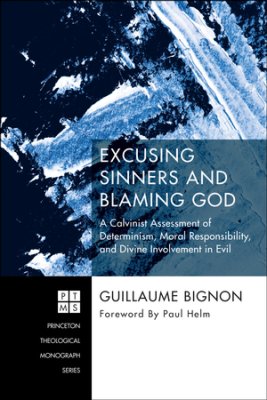Podcast: Play in new window | Download
Subscribe: Spotify | Email | RSS

If a Calvinist view of divine providence and human freedom is correct, which Dr. Guillaume Bignon understands to require compatibilism about human freedom and determinism, does this imply that you and I are not blameworthy for our sins, and that God is? If so, it would seem that any Christian should reject that view of divine providence and human freedom.
In this episode, part two of our conversation (part 1 here) Dr. Bignon summarizes the arguments of each of the ten chapters of his Excusing Sinners and Blaming God: A Calvinist Assessment of Determinism, Moral Responsibility, and Divine Involvement in Evil.
He discusses his contributions to philosophical literature about the “principle of alternate possibilities” and the “consequence argument” against compatibilism, and his analyses of and responses to charges that Calvinism makes God the “author of evil.”
Towards the end, he answers a few of Dale’s objections from scripture and from common sense.
Are you convinced by his account? Are you satisfied with his answers to Dale’s objections? Why or why not?
- Excusing Sinners and Blaming God: A Calvinist Assessment of Determinism, Moral Responsibility, and Divine Involvement in Evil
- @theoloGUI
- Deuteronomy 30:11-20
- This week’s thinking music is “Rubix Cube” by Jason Shaw (aka “audionautix”).


Pingback: New and Upcoming Books (Quarter 1, 2018) – The Oneness Exchange
I enjoyed this discussion. This is one of those topics that all too often generates more heat than light. Fortunately, however, Dr. Bignon is a very winsome defender of Calvinism — and you, Dale, are a very winsome critic.
I feel the gravitational tug of Calvinism’s logic, though it isn’t strong enough to pull me into orbit. The latter part of the discussion where you bring up Hasker’s analogy and onwards is particularly forceful, in my opinion. At the end of the day, one reason I choose to not accept the Calvinist’s story of God’s actions in the world is that I feel it leaves me with no way to love and relate to God. A God that would ultimately ordain all the evil acts committed by men (even granting that on compatibilism those men are still guilty) is *so* foreign and inscrutable that I am at a loss as to how I could have any relationship with him at all, let alone trust him. It’s a bit easier to understand a God who allows men to commit evil because he wanted to create a world where free will exists even if that entails evil actions.
Also, for me at least, on Calvinism I find it hard to avoid a sort of theological Hawthorne effect… i.e. God has determined what my future path will be, but once I’m aware of that it’s incumbent on me to try to figure out what it is. Of course, then I’m not actually making choices, but instead playing some kind of shell game with God. It seems that the only practical way to live is as if my future is undetermined and my choices really are free. But if I practically live as if Calvinism *weren’t* true, then I don’t see what I gain by believing that it is.
I believe Dr. Bignon is going to be on Justin Brierley’s “Unbelievable” show this weekend. I’m looking forward to it.
Thanks again for a stimulating conversation!
Comments are closed.